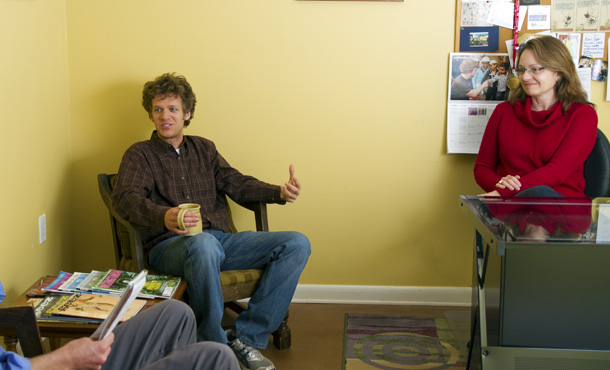Over the last few weeks, I’ve been dispatched to diverse contexts in relationship to Eastern Mennonite University (EMU). This included Spanish conversations in Sarasota, Fla., gathering around a ping-pong table in the basement of a rowhouse in the District of Columbia, and listening to stories of growing up far away while eating at a Mennonite-owned sushi restaurant in Philadelphia.
It’s been a whirlwind of holy adventures and surprising engagements. While these aren’t everyday classroom contexts, I found Mennonite education at its best in some of its most missional practices.
At the Washington Community Scholars Center, students live together for a semester or two while engaging the city. They gather on Wednesday nights to discuss vocation, the city and service led by associate program director (and former MWR assistant editor) Sheldon C. Good. I prepared a conversation as a guest lecturer about career and calling.
I wasn’t prepared for what emerged around the ping-pong table. Students talked about the messy situations that offered a glimpse of their own vocational call.
I wasn’t prepared for the diversity of experiences. They grew up in places like Pennsylvania’s Big Valley, big American cities and Asian countries. They were documented and undocumented; black, white, Latino, Asian; many the first college students in their families. They wept when talking about glimpsing their calls. They lamented. They dreamed.
They wondered how their own identities would shape their future. They celebrate their parents’ gifts and struggle with family dysfunction. They were at EMU for different reasons, in D.C. for different purposes, but the institution had created space for them, hopefully to flourish as they stumble toward vocation, career, calling and conversation.
My next assignment was helping to lead a continuing education event with Southeast Mennonite Conference (SMC), a collaborative arrangement between SMC, Mennonite Central Committee, EMU and Franconia Mennonite Conference. There were 70 students set to engage on issues of leadership in Christian communities.
I was team teaching with Franconia colleagues Angela Moyer and Ertell Whigham. All three of us are from urban Mennonite congregations where Spanish is part of the regular worship experience. In our initial conversations, Floridian leaders wanted to make sure we understood our differences in context. We had more in common than we expected, despite the distance between Sarasota and Pennsylvania. What it means to be Mennonite leaders in both places has changed and is changing.
This group of SMC leaders incarnated the future and present church. There were only four Euro-American leaders. The conversation switched quickly between Spanish and English. We sang a cappella from Mennonite hymnbooks and fluently in Spanish with words projected on the wall. We were from far-flung places — Chicago, Michigan, El Salvador, Honduras, Colombia, Mexico, Haiti — all now worshiping in congregations that make up Mennonite Church USA.
This week a group of students is here in Philadelphia for spring break. As part of helping orient them to the city, I agreed to go along with a dozen students for dinner at one of the four sushi restaurants owned by members of my own Mennonite church, Philadelphia Praise Center.
The group’s leaders are an Indonesian nursing student from my congregation and a young woman who grew up somewhere between India, Virginia and Thailand. These students weren’t who I had expected.
Everyone was bicultural. While the majority were Latino, the other three grew up outside the U.S. Conversations moved around the table in English, Spanish, Thai and Indonesian while we ate sushi together. I felt both challenged and hopeful.
While these are EMU-rooted stories, changes are happening at every Mennonite higher education institution. There’s an invitation in these changes to come closer to the contexts of Mennonite congregations and learn about new realities.
On our campuses, we have new opportunities to be hospitable Anabaptists teaching bright and challenging students who reflect our demographic changes. While the time is difficult to navigate, our opportunities — if we are open to being transformed too — may draw closer to God’s dream for all of us.
[Editor’s Note: This article appeared in MennoWorld Review, March 18, 2013 issue. Stephen Kriss ’94, is associate director of pastoral studies at EMU Lancaster and director of communication and leadership cultivation at Franconia Mennonite Conference. He is a teacher, writer, pastor, student and follower of Jesus living in Philadelphia.]
